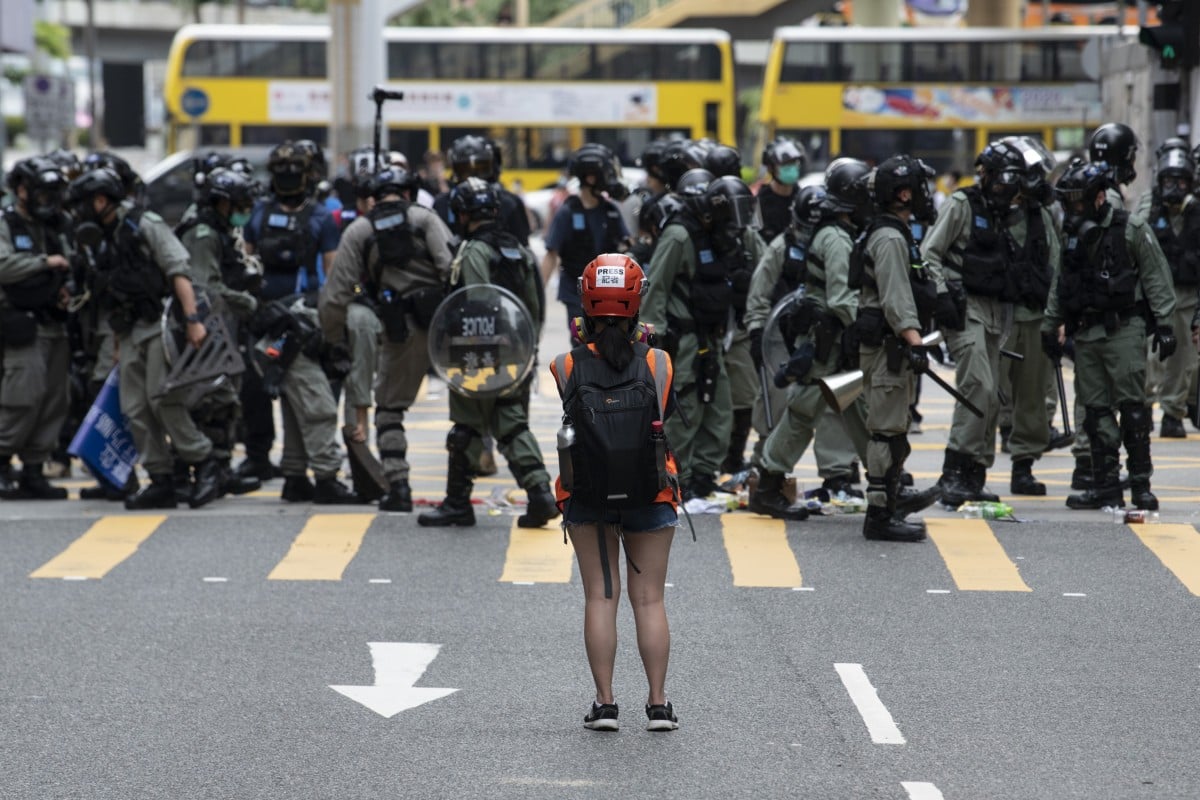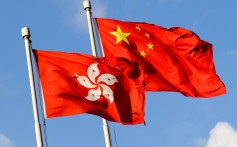Vague language creates uncertainty over who, beyond protesters in the streets, could be accused of subversion, secession or terrorism
Perceived threats to Hong Kong’s high degree of autonomy risk provoking a tough response from Trump, the State Department and Congress
Opinion Michael Chugani 28 May, 2020

A woman stands in front of police during a protest against Beijing's move to enact a new national security law for Hong Kong, in Causeway Bay on May 24. Photo: DPA
Last Friday, after Beijing dropped a bombshell of imposing a national security law on Hong Kong, a foreign journalist asked if I was scared. As a journalist myself, I have to admit I fear the law could harm my work.
When China’s parliament enacts the law, would I still be able to write that I detest the country’s authoritarian government? Would I break the law if I urged the United States to protect Hong Kong’s high degree of autonomy that the Basic Law promised?
Beijing has only laid out national security areas without details, leaving us guessing. Chief Executive Carrie Lam Cheng Yuet-ngor couldn’t answer when a reporter asked if the law would be retroactive. That would have a chilling effect.
Stationing mainland security agents here would, too. The new law allows that, but why the legal permission now when Hong Kong booksellers were abducted in 2015 anyway?
The bombshell was a response to last year’s protests, but the areas puzzle me – subversion, secession, terrorism and foreign interference. Subversion is trying to destroy or overthrow a government. The masses who marched peacefully were opposing an extradition bill, not destroying the government.

When peaceful marches morphed into violent protests after Lam initially refused to kill the bill, the protesters were venting fury over what they saw as eroding freedoms, not trying to overthrow the government.
Secession is separation. A tiny ragtag group of young dreamers advocate independence, but waving independence banners doesn’t mean an actual ability to achieve their aim.
There is no universal definition of terrorism, but the consensus is premeditated violence against not just intended targets but the general public in the name of religious or political ideology.
Last year’s violence involved running battles between protesters and the police, not premeditated action to terrorise the public. There have been several police discoveries of bomb-making material. The government spin is the protest movement is spawning home-grown terrorists.
We won’t know for sure unless suspects are found and tried. Aside from Molotov cocktails, no bombs were thrown or remotely detonated during eight months of protests.
Does foreign interference include former chief secretary Anson Chan Fan On-sang going to Washington to advocate for Hong Kong democracy? Or activist Joshua Wong Chi-fung urging the US to weaponise Hong Kong’s special trade status under the 1992 Hong Kong Policy Act and its 2019 amendment, known as the Hong Kong Human Rights and Democracy Act?
We won’t know until Beijing provides details. Both Beijing and the local government have blasted the Policy Act and its 2019 amendment as interference in China’s internal affairs. The act simply asks Beijing to live up to its promised high degree of autonomy under “one country, two systems” for Hong Kong to qualify for a privileged trading status separate from the mainland.
Hong Kong has benefited from this law since reunification. How can the United States enforcing its own laws be interference? If it is considered to be interference, the simple solution is for Hong Kong and Beijing to tell the United States it doesn’t want special trade status.
The Policy Act requires an annual State Department report. Last year’s report said that, despite diminished autonomy, Hong Kong still qualified for special trade status. Secretary of State Mike Pompeo has now described the national security law as a death knell for Hong Kong’s autonomy. US President Donald Trump has warned he is planning action against China’s security law for Hong Kong.
White House says Beijing’s proposed national security law for Hong Kong could lead to US sanctions
Given these tough words, what will this year’s delayed Policy Act report say? I can only guess, but I can’t see how Pompeo can still give Hong Kong a free pass on special trading status. I still remember Senator Mitch McConnell exclusively revealing the Policy Act to me when I worked in Washington. He was very committed to
upholding the act, which Congress fully supported.
There is likely to be congressional uproar if Trump, in deference to President Xi Jinping, takes only mild action. My guess is doing that would anger many in Congress. They would probably feel the Policy Act and its 2019 amendment, which had unanimous support, have become a toothless tiger.

No comments:
Post a Comment